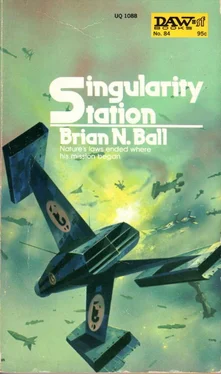“Leave that.” He thought for a moment. “Could we pick him up?”
“Of course, sir! However, it is probable that the nearest patrol-cruiser will be able to reach him in less time.”
“Cruisers,” said Maran. Of course there would be cruisers. It would have been easy to avoid the satellites which were strung out so sparsely in the voids between the spiraling arms of the Galaxy. He could have vanished, along with the powerful ship. Now, the Enforcement Service ships would sniff him out. The big prison-ship would leave a warp-shift clear across the dimensions. Its wake would last for a hundred years. Maran knew enough of deep-space ships to realize that the cruisers’ task was simple. They would follow the ES 110 with the assured ease of hunting dogs. The machines tried to please. Now that Maran was functioning, they were his willing slaves.
“Beam picked up by Service vessel, sir,” the Grade One robot reported. “Instructions? Scanners report second survival-cylinder beam also reaching cruiser.”
“Second cylinder?” Maran said. In the moment of realization that the alert had been beamed, he had overlooked the report of a second launching.
The Grade Two system hastened to explain: “Second survival-cylinder also launched by female Deffant. But no Red Alert condition now exists,” it added defensively.
Maran remembered the shocked face of a young woman. The eyes glowed with intelligence, though, intelligence and resolution. “She was a crew-member?”
“Miss Deffant had crew status,” obliged the Grade One robot. “She had authority to launch the cylinders.”
“Miss Elizabeth Deffant is an employee of the New Settlements Bureau,” added a lower-grade system.
“So she got herself and Rosario away,” Maran said aloud. She was resourceful.
“No, sir.”
Maran checked as he was about to order a change of course. “Rosario is in one cylinder?”
“Yes, sir.”
“And in the other?”
“It was released empty, sir.”
“Where is she?”
The machines were silent. Maran ordered a search of the vessel. The orders were delegated to servitor-scanners. There was an atmosphere of quiet cooperation, complete subservience, and some apprehension in the ship. The robots sensed Maran’s dissatisfaction. Sight orifices explored the recesses of the ship. “Female Deffant is on the survival-deck,” a Grade Two system announced. “She gave authority for release of two cylinders. This is a direct contravention of Galactic Council—” Maran waited with an intense patience. Ideas thronged his busy mind. He thought of the vast, boiling wake left by the ES 110. He could visualize the gray-black snouts of the cruisers as they arrowed onto that flooding wake. Somewhere, two cylinders tumbled and eddied among the storms of hyperspace. Gradually, the ideas became coherent.
“Miss Deffant is leaving the survival-cylinder hold,” the Grade Two system announced. Maran waited. It was impossible—a lone woman?
“Female Deffant is on the cell-deck!”
The robot was incredulous.
“The assignment is one of observation, not investigation, sir! I have to remind you—” Buchanan suffered the arguments for five minutes. It was right. The machine was programmed to remind him of his primary task. Then he grew tired of argument.
“Now.”
He was too tense to relax in the comfortable command-chair. Ratlike sensors writhed into his palms. And still the robotic controller pointed out that it was his task to report on the Jansky Singularity, not to enter it.
“I am assuming command,” he said. “No more questions, no more advice.”
“Sir—”
“The station is within the Singularity’s parameters.”
“This Grade One robot agrees,” it said reluctantly. “Therefore command decisions rest with the commander of the Jansky Singularity Station. And you, Commander Buchanan, are the commander of the Jansky Singularity Station.”
“In. Now.”
“Yes, sir. According to your instructions.”
It was the Altair Star engulfment all over again. Buchanan waited, filled with dread, fearing more than death. But huge engines surged to combat the grip of the Singularity’s fields. The station nicked inward, rolling into the rotating, glowing phenomenon. Shields sprang out to counteract grotesque forces. The station vanished into the Singularity.
Across the spiraling arms of the Galaxy, long gray cruisers turned and activated drives seldom used. They blasted through endless reaches of infragalactic space, across the starways of the dimensions and clear through to the gulfs where two survival-cylinders drifted in the wake of the ES 110. The commander of the nearest cruiser gave sharp, terse orders. The spaceways began to empty. Passenger liners wheeled away into safer regions; colossal cargo-ships ten miles long and crewed by servo-robots lumbered out of the cruisers’ field of fire; tiny yachts shot into contiguous quadrants yapping out irate questions. There were no answers.
Soon, the gray-black snout of the cruiser drifted near the slowly-tumbling cylinders. Force-fields sprang out and the enigmatic pods were drawn inboard, still flooding the beamer-channels with their siren-blasts: Red Alert! Red Alert! All Enforcement Service ships rebeam! Red Alert! The noise was cut off abruptly. Three cruisers could handle anything known in the Galaxy, possibly in the Universe. They were the striking force of the Service. Their armament was always in a state of readiness. Tensely the crew waited as armored robots filleted the survival-pods. They took no chances. Blast-walls protected them, radiation-suits encased them; and it was left to the servo-robots to recover the contents of the pods. But when they saw the badly-wounded man, immobile, drugged, half conscious but still struggling to frame his message, they raced to him.
He said one word, but that was enough. Loaded with partially-suppressed agony, he breathed:
“Maran!” And then he began his fight for life. The ship’s commander, a tall gray-haired man whose days in the Service were almost at an end, did not reveal his thoughts as he gazed at the leaden, shrunken face.
“He’ll make it,” offered the medical officer. The commander nodded. “If he says anything else, let me know.” A youngish lieutenant burst out: “Why wasn’t there anyone in the other pod—why two of them? How could Rosario have launched two pods?”
The commander was thinking of Maran. Maran loose: free to begin that frightful series of neural operations…. “We’ll know when we reach the ES 110,” he told the young officer. He crossed to the gray metal coldly-functional console. Robotic servo-mechanisms sensed his nearness and awaited his orders. The cruisers were the only ships programmed for complete and unquestioned control by human personnel. There were those in positions of power who questioned the wisdom of risking fallible human discretion, but the members of the Service had so far persuaded the Galactic Council that the robots could not cope with the situations in which they might find themselves. They had not the resources for the kind of decision that occasionally must be made.
The commander spoke to his field man: “Link with the squadron. Try a combined submolecular field. I want the ship intact.”
Liz Deffant’s hands were steady as she pieced together the surprisingly elaborate mechanism. Several screws had to be wound into place. There was a sighting apparatus—merely a notch, but it would be adequate. The weapon had a short range. About a hundred yards, Liz guessed. A small hammer held the flint. There were springs, ratchets, a flashpan. All had to be in alignment. The propulsive force was a black powder, a mixture of easily-available chemicals. Out at the Rim, the expellees would have no difficulty in locating sources for the primary materials. Before a year or so passed, they would be able to manufacture simple tools like this for themselves. Pour the grains of powder into the upturned barrel of the weapon, she read. She split the cartridge and made a wadding from the cartridge-paper.
Читать дальше












